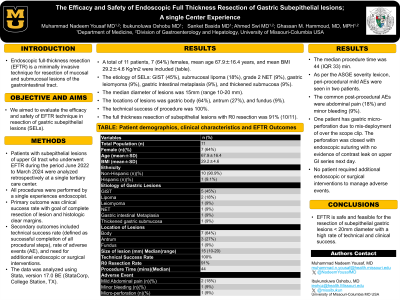Monday Poster Session
Category: Interventional Endoscopy
P2762 - The Efficacy and Safety of Endoscopic Full Thickness Resection of Gastric Subepithelial Lesions. A Single Center Experience
Monday, October 28, 2024
10:30 AM - 4:00 PM ET
Location: Exhibit Hall E

Has Audio

Ibukunoluwa E. Oshobu, MD
University of Missouri Health Care
Columbia, MO
Presenting Author(s)
Muhammad Nadeem. Yousaf, MD, Ibukunoluwa E. Oshobu, MD, Sanket Basida, MD, Ahmed I.A. Swi, MD, Ghassan Hammoud, MD
University of Missouri Health Care, Columbia, MO
Introduction: Endoscopic full-thickness resection (EFTR) is a minimally invasive technique for resection of mucosal and submucosal lesions of gastrointestinal tract. We aimed to evaluate the efficacy and safety of EFTR technique in resection of gastric subepithelial lesions (SELs).
Methods: This is a retrospective, single-center study of consecutive patients with subepithelial lesion of upper GI tract who underwent EFTR between June 2022 to March 2024. Primary outcome was complete resection of lesion with clear margins. Secondary outcomes included technical success rate (defined as successful completion of all procedural steps), rate of adverse events (AE), and need for additional endoscopic or surgical interventions. The data was analyzed using Stata, version 17.0 BE (StataCorp, College Station, TX).
Results: A total of 11 patients, 7 (64%) females, mean age 67.9±16.4 years, and mean BMI 29.2±4.6 Kg/m2 were included. Demographic, baseline patients’ characteristics and clinical data shown in table. The etiology of subepithelial lesions were gastrointestinal stroma tumor (GIST) (45%), submucosal lipoma (18%), grade 2 neuroendocrine tumor (9%), gastric leiomyoma (9%), gastric Intestinal metaplasia (9%), and thickened submucosa (9%). The median diameter of lesions was 15mm (range 10-20 mm). The common location of lesions was gastric body (64%), antrum (27%), and fundus (9%). The technical success of procedure was 100%. The full thickness resection of subepithelial lesions with R0 resection was 91% (10/11). The median procedure time was 44 (IQR 33) min. As per the ASGE severity lexicon, peri-procedural mild AEs were seen in two patients. The common post-procedural AEs were abdominal pain (18%) and minor bleeding (9%). One patient has gastric micro-perforation due to mis-deployment of over the scope clip. The perforation was closed with endoscopic suturing with no evidence of contrast leak on upper GI series next day. No patient required additional endoscopic or surgical interventions to manage adverse events.
Discussion: EFTR is safe and feasible for resection of subepithelial gastric lesions < 20mm diameter with a high technical and clinical success rates. Large multicenter prospective studies are required for validation of safety and efficacy of EFTR.
Note: The table for this abstract can be viewed in the ePoster Gallery section of the ACG 2024 ePoster Site or in The American Journal of Gastroenterology's abstract supplement issue, both of which will be available starting October 27, 2024.
Disclosures:
Muhammad Nadeem. Yousaf, MD, Ibukunoluwa E. Oshobu, MD, Sanket Basida, MD, Ahmed I.A. Swi, MD, Ghassan Hammoud, MD. P2762 - The Efficacy and Safety of Endoscopic Full Thickness Resection of Gastric Subepithelial Lesions. A Single Center Experience, ACG 2024 Annual Scientific Meeting Abstracts. Philadelphia, PA: American College of Gastroenterology.
University of Missouri Health Care, Columbia, MO
Introduction: Endoscopic full-thickness resection (EFTR) is a minimally invasive technique for resection of mucosal and submucosal lesions of gastrointestinal tract. We aimed to evaluate the efficacy and safety of EFTR technique in resection of gastric subepithelial lesions (SELs).
Methods: This is a retrospective, single-center study of consecutive patients with subepithelial lesion of upper GI tract who underwent EFTR between June 2022 to March 2024. Primary outcome was complete resection of lesion with clear margins. Secondary outcomes included technical success rate (defined as successful completion of all procedural steps), rate of adverse events (AE), and need for additional endoscopic or surgical interventions. The data was analyzed using Stata, version 17.0 BE (StataCorp, College Station, TX).
Results: A total of 11 patients, 7 (64%) females, mean age 67.9±16.4 years, and mean BMI 29.2±4.6 Kg/m2 were included. Demographic, baseline patients’ characteristics and clinical data shown in table. The etiology of subepithelial lesions were gastrointestinal stroma tumor (GIST) (45%), submucosal lipoma (18%), grade 2 neuroendocrine tumor (9%), gastric leiomyoma (9%), gastric Intestinal metaplasia (9%), and thickened submucosa (9%). The median diameter of lesions was 15mm (range 10-20 mm). The common location of lesions was gastric body (64%), antrum (27%), and fundus (9%). The technical success of procedure was 100%. The full thickness resection of subepithelial lesions with R0 resection was 91% (10/11). The median procedure time was 44 (IQR 33) min. As per the ASGE severity lexicon, peri-procedural mild AEs were seen in two patients. The common post-procedural AEs were abdominal pain (18%) and minor bleeding (9%). One patient has gastric micro-perforation due to mis-deployment of over the scope clip. The perforation was closed with endoscopic suturing with no evidence of contrast leak on upper GI series next day. No patient required additional endoscopic or surgical interventions to manage adverse events.
Discussion: EFTR is safe and feasible for resection of subepithelial gastric lesions < 20mm diameter with a high technical and clinical success rates. Large multicenter prospective studies are required for validation of safety and efficacy of EFTR.
Note: The table for this abstract can be viewed in the ePoster Gallery section of the ACG 2024 ePoster Site or in The American Journal of Gastroenterology's abstract supplement issue, both of which will be available starting October 27, 2024.
Disclosures:
Muhammad Yousaf indicated no relevant financial relationships.
Ibukunoluwa Oshobu indicated no relevant financial relationships.
Sanket Basida indicated no relevant financial relationships.
Ahmed Swi indicated no relevant financial relationships.
Ghassan Hammoud indicated no relevant financial relationships.
Muhammad Nadeem. Yousaf, MD, Ibukunoluwa E. Oshobu, MD, Sanket Basida, MD, Ahmed I.A. Swi, MD, Ghassan Hammoud, MD. P2762 - The Efficacy and Safety of Endoscopic Full Thickness Resection of Gastric Subepithelial Lesions. A Single Center Experience, ACG 2024 Annual Scientific Meeting Abstracts. Philadelphia, PA: American College of Gastroenterology.
